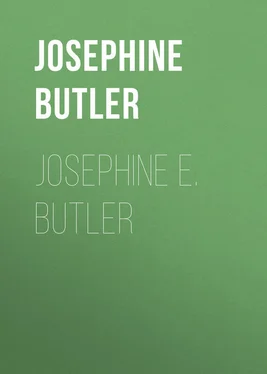Josephine Butler - Josephine E. Butler
Здесь есть возможность читать онлайн «Josephine Butler - Josephine E. Butler» — ознакомительный отрывок электронной книги совершенно бесплатно, а после прочтения отрывка купить полную версию. В некоторых случаях можно слушать аудио, скачать через торрент в формате fb2 и присутствует краткое содержание. Жанр: foreign_antique, foreign_prose, на английском языке. Описание произведения, (предисловие) а так же отзывы посетителей доступны на портале библиотеки ЛибКат.
- Название:Josephine E. Butler
- Автор:
- Жанр:
- Год:неизвестен
- ISBN:нет данных
- Рейтинг книги:5 / 5. Голосов: 1
-
Избранное:Добавить в избранное
- Отзывы:
-
Ваша оценка:
- 100
- 1
- 2
- 3
- 4
- 5
Josephine E. Butler: краткое содержание, описание и аннотация
Предлагаем к чтению аннотацию, описание, краткое содержание или предисловие (зависит от того, что написал сам автор книги «Josephine E. Butler»). Если вы не нашли необходимую информацию о книге — напишите в комментариях, мы постараемся отыскать её.
Josephine E. Butler — читать онлайн ознакомительный отрывок
Ниже представлен текст книги, разбитый по страницам. Система сохранения места последней прочитанной страницы, позволяет с удобством читать онлайн бесплатно книгу «Josephine E. Butler», без необходимости каждый раз заново искать на чём Вы остановились. Поставьте закладку, и сможете в любой момент перейти на страницу, на которой закончили чтение.
Интервал:
Закладка:
I went down to the oakum sheds and begged admission. I was taken into an immense gloomy vault filled with women and girls – more than two hundred probably at that time. I sat on the floor among them and picked oakum. They laughed at me, and told me my fingers were of no use for that work, which was true. But while we laughed we became friends. I proposed that they should learn a few verses to say to me on my next visit. I recollect a tall, dark, handsome girl standing up in our midst, among the damp refuse and lumps of tarred rope, and repeating without a mistake and in a not unmusical voice, clear and ringing, that wonderful fourteenth chapter of St. John’s Gospel – the words of Jesus all through, ending with, “Peace I leave with you. My peace I give unto you. Let not your heart be troubled, neither let it be afraid.” She had selected it herself, and they listened in perfect silence, this audience – wretched, draggled, ignorant, criminal some, and wild and defiant others. The tall, dark-haired girl had prepared the way for me, and I said, “Now let us all kneel, and cry to that same Jesus who spoke those words”; and down on their knees they fell every one of them, reverently, on that damp stone floor, some saying the words after me, others moaning and weeping. It was a strange sound, that united wail – continuous, pitiful, strong – like a great sigh or murmur of vague desire and hope, issuing from the heart of despair, piercing the gloom and murky atmosphere of that vaulted room, and reaching to the heart of God.
But I do not want to make a long story of this. The result of my visits to the hospital and quays and oakum sheds was to draw down upon my head an avalanche of miserable but grateful womanhood. Such a concourse gathered round our home that I had to stop to take breath, and consider some means of escape from the dilemma by providing some practical help, moral and material. There were not at that time many enlightened missions or measures in the town for dealing with the refuse of society. There was the Catholic Refuge of the Good Shepherd, some way in the country; an old-fashioned Protestant Penitentiary, rather prison-like in character; another smaller refuge; and, best of all, a Home recently established by Mrs. Cropper. But it must not be supposed that the majority of my oakum shed friends were of a character to seek such asylums. Many of them – and especially the Irish Catholics – prided themselves on their virtue; and well they might, considering their miserable surroundings – girls who for the most part earned a scanty living by selling sand in the streets (for cleaning floors), or the refuse of the markets to the poorest of the population. Usually they were barefooted and bonnetless. The Lancashire women are strong and bold. The criminals of the oakum sheds and prison, sent to “do a week” or a month there, had most frequently been convicted of fighting and brawling on the quays and docks, of theft or drunkenness. There was stuff among them to make a very powerful brigade of workers in any active good cause. But there were others – the children of intemperate and criminal parents – who were, humanly speaking, useless, not quite “all there,” poor, limp, fibreless human weeds. These last were the worst of all to deal with. I had the help at this time of a widowed sister who was visiting Liverpool, and who, in spite of very delicate health, threw herself heroically into the effort to help this work without a name which came upon us. We had a dry cellar in our house and a garret or two, and into these we crowded as many as possible of the most friendless girls who were anxious to make a fresh start. This became inconvenient, and so in time my husband and I ventured to take a house near our own, trusting to find funds to furnish and fill it with inmates. This was the “House of Rest,” which continued for many years, and developed, about the time we left Liverpool, into an incurable hospital, supported by the town. It was there that, a little later, women incurably ill were brought from the hospitals or their wretched homes, their beds in hospital being naturally wanted for others.
A few months later, encouraged by the help offered by a certain number of generous Liverpool merchants and other friends, we took a very large and solid house, with some ground round it, to serve as an industrial home for the healthy and active, the barefooted sand girls, and other friendless waifs and strays. We had a good gathering of friends and neighbours at a service which my husband held at the opening of the industrial home. His “dedication prayer” on that occasion was very touching, and full of kindness and heart-yearning towards the poor disinherited beings whom we desired to gather in. This house was very soon filled, and was successfully managed by an excellent matron, a mother. Besides the usual laundry and other work, we were able to set up a little envelope factory in one of the spacious rooms. This work called out some skill and nicety, and interested the girls very much. Several tradesmen and firms bought our envelopes at wholesale prices, and we also supplied some private friends disposed to help us. As chaplain, friend and adviser in these two modest institutions, my husband showed the same fidelity and constancy which he did in every other seriously accepted or self-imposed duty. He often said that it was a rest and refreshment to him to visit our poor people in the evening, and more especially on Sunday. In the House of Rest were received “incurables” so-called (of whom not a few recovered). There was a very peaceful atmosphere in that house answering to its name – a spirit of repose, contentment, and even gaiety among the young inmates, scarcely clouded even by the frequent deaths, which came generally as a happy and not unexpected release, and were regarded by the living as a series of fresh bonds between the family in heaven and that on earth.
Drink was the great, the hopeless obstacle which I found among them. It was on this side that they would lapse again and again. Though it involved no change in my own habits, I thought it was best to take the pledge. I joined the Good Templars, who had many lodges in Liverpool.
Shortly before the creation of these two homes, we had a visit from my sister, Madame Meuricoffre. She and her husband, with their dear little girl, Josephine, had come from Naples to England, and had paid a visit to our father in Northumberland. They had, a short time before, lost a beloved child, their little Beatrice, during an outbreak of the cholera in Naples. The surviving little girl seemed to droop after the death of her companion. She (little Josephine) took ill on the way from the north, and before they reached Liverpool this darling of her parents had gone to join her beloved sister in the presence of God. The parents came to us in deep sorrow, bringing with them the earthly remains of their child.
My sister joined me in my visits to the sick, criminal, and outcast women of Liverpool. We visited the wards of the great hospital together. The strong sympathy of her loving nature quickly won the hearts of desolate young girls, while she greatly strengthened me in the hope that we might be able to undo some of their heavy burdens.
Among the first who came to us to our own house, to die, was a certain Marion, who seemed to us a kind of first-fruits of the harvest, in the gathering in of which we were to be allowed in after years to participate. The first time I saw her was in a crowded room. Her face attracted me: not beautiful in the common acceptation of the word, but having a power greater than beauty; eyes full of intelligence and penetration; a countenance at once thoughtful and frank, with at times a wildly seeking look, as if her whole being cried out, “Who will show us any good?” She was ill, her lungs fatally attacked. I went up to her, and with no introduction of myself said, “Will you come with me to my home and live with me? I had a daughter once.” She replied with a gasp of astonishment, grasping my hand as if she would never let it go again. I brought her home, my husband supported her upstairs, and we laid her on the couch in the pretty little spare room looking on the garden. She lived with us, an invalid, three months, and then died. It was difficult to suppress the thought, “If she had not been so destroyed, what a brightness and blessing she might have been in the world.” Untaught, unacquainted with the Scriptures till she came to us, she mastered the New Testament so thoroughly in that brief time that her acute questions and pregnant remarks were often a subject of wonder to my husband, who spent a portion of almost every evening with her in her room, conversing with and instructing her. Some of the intellectual difficulties which assail thoughtful students occurred to her. I witnessed many a severe struggle in her mind. She would often say, “I will ask Mr. Butler about it this evening.” But her questions were sometimes such as cannot be answered, except by God Himself to the individual soul. This she knew, and through many sleepless nights her murmured prayers were heard by her attendant, “preventing the night watches.” My husband said her remarks concerning the nature of a true faith sometimes strikingly resembled portions of the writings of a well-known modern philosophical thinker, which she had never read, for she had read nothing. I speak of her intellect, but her heart was yet greater. What capacities for noble love, for the deepest friendship, had been trampled under foot in that dear soul.
Читать дальшеИнтервал:
Закладка:
Похожие книги на «Josephine E. Butler»
Представляем Вашему вниманию похожие книги на «Josephine E. Butler» списком для выбора. Мы отобрали схожую по названию и смыслу литературу в надежде предоставить читателям больше вариантов отыскать новые, интересные, ещё непрочитанные произведения.
Обсуждение, отзывы о книге «Josephine E. Butler» и просто собственные мнения читателей. Оставьте ваши комментарии, напишите, что Вы думаете о произведении, его смысле или главных героях. Укажите что конкретно понравилось, а что нет, и почему Вы так считаете.












